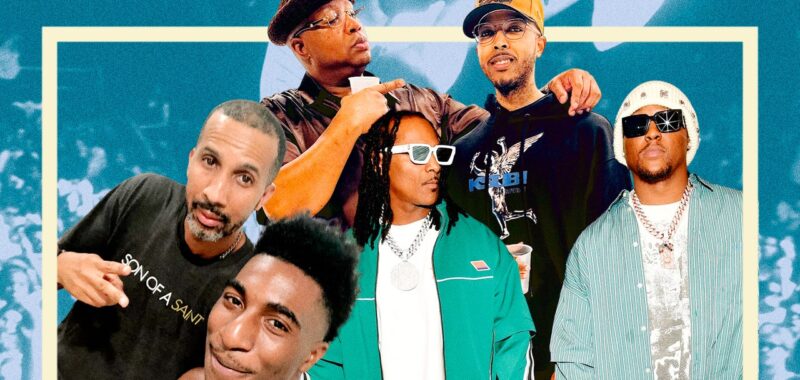A few years later, Droop-E would actually rap on his father’s magnum opus, 1995’s In A Major Way. Billed then as Lil E, he appears on “It’s All Bad,” a contemplative track about society, police violence, and systemic racism. (E-40 having his son ask his father to “sprinkle me with more game” is one of hip-hop’s truly perfect moments.) 40 wrote his son’s verse, but the five-year-old nailed it, showing a natural comfort and skill as a vocalist. The pair continue to make music together, though Droop-E has carved out his own sonic niche, from collaborations with Kendrick Lamar to alternative-leaning projects like 2023’s 4005: Lovesong EP. His father, who released 10 studio albums between 2010 and 2013, is one of the most prolific figures in all of music, and that work ethic has inspired Droop-E since childhood.
“He made a statement to me maybe four months ago,” 40 recalls. “He said, ‘Pops, ever since I was born, all I’ve ever seen you do was hustle.’ I thought about it and realized ‘You fucking right.’”
Young Juve, who attended the music-focused college Full Sail, knows how to produce and mix, and has also been involved in designing merch for his dad. Droop-E serves as president of 40’s Sick Wid It label, and has made beats for not only his father, but Yelawolf, Too Short, and Keak da Sneak, too. Droop-E began working for his dad’s label when he was still in high school, and effectively became its president immediately after finishing high school. Sick Wid It began in 1989, a year after Droop-E was born, and it still stands today as a testament to 40’s singular musical legacy, one that he’s thrilled to have his son shepherding.
“I’m glad this is a family business and he feels right in place, playing this position,” E-40 says. “It means everything to me.”
In the cases of Mac Phipps and Big Hit, making music with their sons has helped them build a bond and make up for lost time. Both artists missed much of their boy’s life due to incarceration, Phipps in a case of wrongful conviction for manslaughter that kept him in prison for 20 years and Hit for offenses like drug possessions that resulted in two decade-plus stints.
Phipps’ case was a high-profile incident of rap lyrics being used as evidence in a criminal trial, and the former No Limit MC does acknowledge that he felt some reservations about his son rapping particularly when he heard some of the “street element” in Kin’s music.
“That’s kind of what they used against me in court,” he says. “I don’t think it was an overwhelming sense of urgency, but I was just nervous for him because I never wanted him to have experienced [what I did].”
Phipps is a strong supporter of laws that restrict the use of song lyrics in trials, but that campaign is still a work in progress. Still, he loves sharing a passion with his son, and says that Kin’s early music helped him connect to and empathize with the child who was only three months old when his father began serving time.

